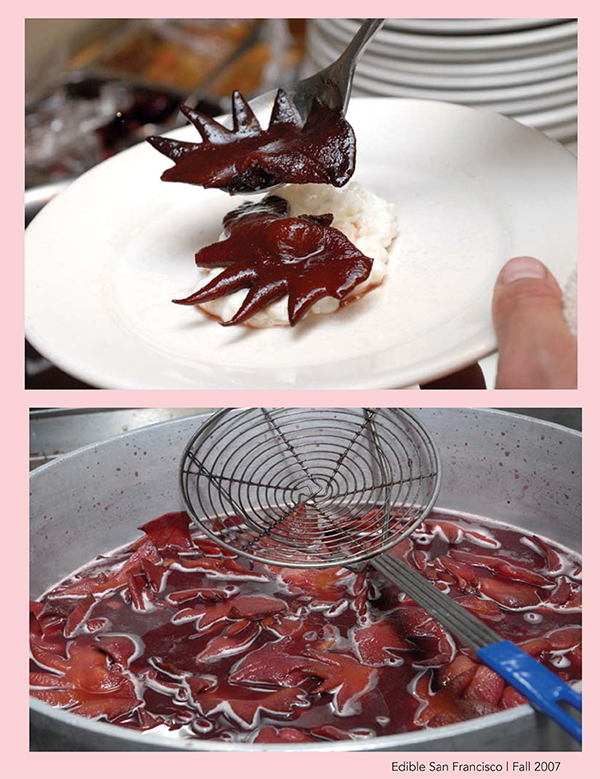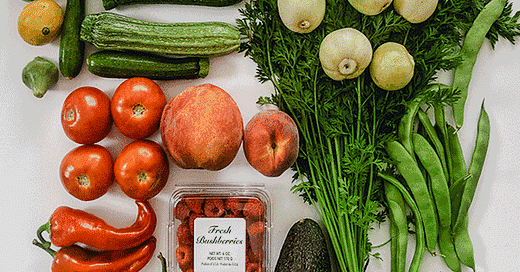#9 | Who Let the Wolves Out?
Plus Frog and Toad go out for dinner after a month of self-quarantine
Hello!
This week’s newsletter (the 9th edition of EAT. DRINK. THINK., now that we’re keeping track) includes a Texas couple that entertained the thought of using a pack of wolves to corral their bison herd. We kid you not.
By the way, I'm Bruce Cole, Publisher of Edible San Francisco. You're getting this email because you subscribed. You’ll notice that things look a bit different this week as we’ve switched from Mailchimp to Substack.
If you like this newsletter, consider sharing it with your friends (all of them 😉), por favor.
First up, carrots, because they’re good for you.
EAT

Roasted Farmers Market Carrots with Cilantro Yogurt Sauce
Our friends at CUESA generously offered us one of their farmers market boxes and we rounded up recipes for all the seasonal bounty, including these glorious carrots. Get the recipe. Photos: Bruce Cole
•
White People Prices
Resy’s new guide to SF’s Chinatown (and Chinese restaurants) by MacKenzie Chung Fegan, is an insiders look at places you have may never heard of, like Kam Lok Restaurant and Yuanbao Jiaozi. One place on the list we’re familiar with though is Mister Jiu’s, helmed by chef Brandon Jew. Fegan’s mother, however, is not a fan, exclaiming that the prices are too expensive for Chinese cuisine. Why is it, for example, that diners will gladly fork over $20 for a plate of spaghetti at SF’s upscale restaurants, but then balk at the same price for a bowl of ramen or pho? They’re both noodles, right?
As acclaim for Jew’s cooking grew, garnering him a Michelin star and a spot on Bon Appétit’s Hot Ten list, I insisted my mom and I go next time I returned home from New York. She was dismissive. “Twenty-two dollars for dumplings? Over a hundred for Peking duck? Those were white-people prices.” –MacKenzie Chung Fegan for Resy
Related (from our 2014 archives): Cheapskates: A Case for Paying More for Ethnic Food.
•
19th Century Hipsters


•

Tastes Like…
What’s the human cost of a chicken sandwich? Poultry processing plants chew up chickens at a rate of 175 birds per minute (per USDA’s Food Safety and Inspection Service line speed waivers enacted in 2020). That speed effectively chews up the workers doing the processing too, and adding Covid-19 to the mix makes working conditions even more dangerous.
Meanwhile, we have a hazy picture of the human cost associated with savoring our bacon and chicken nuggets. The industry tells us that halting production in meat processing plants will leave a large gap in our ability to feed ourselves…However, there is a more significant and growing cost for keeping the plants open, which can be counted in human lives.–Shorlette Ammons for The Bitter Southerner | Photo: Bitter Southerner
Related: After 8 workers die of COVID-19, officials want Merced County Foster Farms plant closed.

Also related: Cockscombs (like those pictured atop that chicken sandwich ☝️) are indeed edible. Flashback to our Edible SF Fall 2007 issue (above) where we shared a story on chef Chris Cosentino’s candied cockscomb with cherries and rice pudding dessert. Photos: Michael Harlan Turkell.
p.s. KFC tells customers to hold off on the 'Finger Lickin' for now.
DRINK
Trying to Drink Less in Covid-19 Quarantine?
Does using smaller glasses count?
But what if there were a nonalcoholic beverage worth lingering over? The kind of drink that deserves to be held in the mouth and rolled across the palate, the kind that ultimately leaves an impression? Something challenging. Something bitter. –Julia Bainbridge for the NY Times.
Fifth Wave Coffee?
A coffee shop in Denver raised prices 50 percent to pay employees a living wage. Customers called it price gouging.
“We raised prices not to necessarily boost the business’s bottom line, but to be able to give all of our staff a raise and actually have them on salary. So they’re able to make a feasible amount of money to live in a city and have some sort of quality of life that isn’t paycheck to paycheck.” Elle Taylor, owner of Amethyst Coffee. –Lily O’Neill for BusinessDen.com | h/t Katherine Spiers at Smartmouth
From last weeks newsletter: Fourth Wave Coffee is not what you think.
THINK

Farmer Chef Preeti Mistry
The chef, author, culinary activist and farmer, looks back at the beginning of her restaurant career at Juhu Beach Club.
“A really pivotal moment for me in my career was 2013, when the Black Lives Matter movement started. I had just opened my first restaurant (Juhu Beach Club)… I realized at that moment that I could use my platform as a restaurant owner and business leader to amplify this message. That has become very important to me, that I use my voice and my platform always to amplify other people’s messages.” –Ava Duvernay for Harpers Bazaar | Photo: Shaniqwa Jarvis
•
Who Let the Wolves Out?
At Roam Ranch in Texas, Taylor Collins and Katie Forrest are implementing regenerative agriculture practices in an effort to restore and maintain grasslands. And they’re doing it with bison instead of cattle, in a sense trying to replicate the regenerative effects that the massive herds of buffalo had on the native prairies a millennia ago.
Collins and Forrest initially thought about emulating this part of nature by installing high fences around Roam Ranch and controlling their (bison) herd’s grazing patterns with a pack of wolves. (“Then we thought, ‘What if all the wolves get out?’ ” Collins said.) Instead, Forrest and Collins use a portable electrified fence to move their herd around, sometimes several times a day. –Eric Benson for Texas Monthly
•
Define Food Justice


•
Define Sustainability
We sometimes joke that instead of putting this newsletter together we should just copy and paste Alicia Kennedy’s brilliant takes from her newsletter instead and say, “here, read this.”
It means properly paid restaurant staff at the farm-to-table restaurant and every restaurant, café, and market—or else they should not exist. It means safety, living wages, and the right to organize for farmworkers and those processing meat, whether at small or industrial levels. It means breaking up industrial food production, full stop. It means systems are in place making sure everyone is fed on a daily basis, and systems are in place to respond to emergency, whether that is a literal storm that wipes out a crop or a global pandemic that leaves most workers vulnerable, with a government that won’t step in to help. –Alicia Kennedy in her newsletter: From the Desk of Alicia Kennedy
•
Define Resilient
“I see farmers being praised on Instagram for showing up to market despite missing two nights of sleep, or being committed to delivering CSA boxes during a mandatory evacuation...We have conflated resilience with sacrifice, and usually that sacrifice comes from our mostly Latinx workforce. We have let the values of toxic masculinity override the humanity of our people. A food system that falls apart without people breathing smoke to get strawberries on the table is not resilient.” –Scott Chang-Fleeman for the SF Chronicle
You Can Support Farmers Impacted by the Recent Fires:
With CAFF’s California Family Farmer Emergency Fund
•
Big Gulp
Fast food chains like Chipotle, Domino’s and Dunkin are using the Covid-19 apocalypse to takeover leases from struggling restaurants.
In other words, the pandemic is paving the way for chains to take over the American restaurant industry. As independent restaurants struggle to stay afloat, the looming domination of chains seems inevitable. –Kate Taylor and Irene Jiang for Business Insider.
•
Lastly
We’d pretty much given up on Bon Appétit, especially their ever popular YouTube channel. But now we may have to reconsider. Can we imagine a radically new Bon App minus all the white-bro-hipster editorial banter?
One More Thing
Frog and Toad Tentatively Go to a Restaurant After Months in Self-Quarantine
Toad and Frog stood outside a French bistro.
Inside, a sparrow, two dragonflies, and a field mouse were having dinner together.
They looked like they were having a good time.
“Time to go in,” said Frog.
Toad and Frog did not move.
“Here we go,” said Toad. “Dinner time.”
Toad and Frog still did not move.
“Toad,” said Frog, “I do not feel it is safe yet.”
“I was about to say the same thing,” said Toad.
They were being cautious.
It was a good warm feeling.
That’s all for this week. We need a drink. There’s four bottles of mezcal in the cupboard, just have to pick one. 🤔
Do you follow us?
Twitter 53K+ followers
Instagram 25K+ followers
Did you miss last week's newsletter? Check it here.
If you like this newsletter, please forward it to a friend.
And if you made it here by chance and like the looks of things so far:
Be well and take care,
–Bruce





